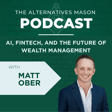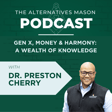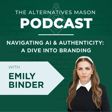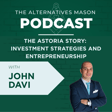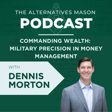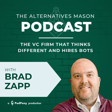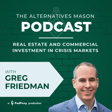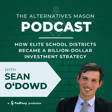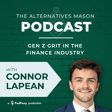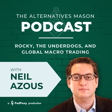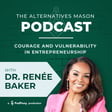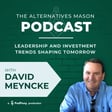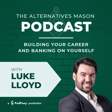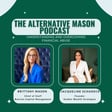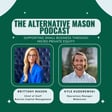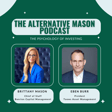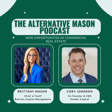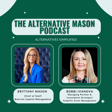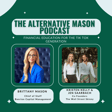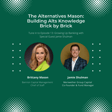Become a Creator today!Start creating today - Share your story with the world!
Start for free
00:00:00
00:00:01

The Alternatives Mason: Building Alts Knowledge Brick by Brick | Episode 22 | Planning For the End, Preparing For the Future with Jamie Hopkins
What do a fog machine, digital assets, and mentorship have in common? They’re all part of Jamie Hopkins’ journey in finance. From his childhood experiences with money to his career as foremost retirement expert, Jamie shares insights on building a secure financial future and shaping the next generation of advisors.
Connect with us below!
Transcript
Introduction to Brittany Mason and Jamie Hopkins
00:00:00
Speaker
In general, the United States is a little bit more of a death-denying society. We don't really like to talk about our own mortality, our own death. That reduces some of our planning, so we're not great end-of-life planners and state planning.
00:00:15
Speaker
Welcome to the Alternatives Mason podcast. With host Brittany Mason, Chief of Staff at Bonnerian Capital Management, you'll learn how to build alternatives knowledge brick by brick. Bonnerian Capital Management uses technology to help independent advisors scale and educate themselves on alternative investments. And since education is such a big piece of what we do, we are excited to kick off the series to dive into the nits and grits of the alternative space. um Hello, everyone. I am Brittany Mason, your host of The Alternative Mason, where we are building your alt knowledge brick by brick. We are back with another episode and this episode we have Jamie Hopkins. He is the CEO of Brandmar Capital Management.
00:01:00
Speaker
and a Wall Street Journal best-selling author and educator. He also holds multiple advanced degrees.
Jamie's Formative Money Memories
00:01:07
Speaker
And, you know, he is also the founder of Finserv Foundation, a nonprofit dedicated to financial literacy, and is also recognized as a top 10 Investopedia 100 top financial advisor for 2023. I am so excited to ah finally have you on the show, Jamie. How are you today?
00:01:27
Speaker
Well, thank you. Thanks for having me on. And yeah, excited to talk to you today and really excited to finally have you on and have a nice little chat about all the things that you do. And if, you know, I know you're familiar with the show, I always like to start things off with really getting to know, uh, you know, what is your first introduction to money? Because I feel like, you know, our behavior and our relationship to money, it just shaped so much of, you know, who we are in our direction in life. So for you, what is that earliest memory?
00:01:57
Speaker
Well, I'm going to tell two stories today on the earliest money memories. And it is actually the neither one of my earliest money memory, but they are very formative to my early money memories. And so um the most formative one is, that you know, when I was eight years old, my my dad passed away on a worksite accident and ah He was a construction worker, did gutters, was up on a roof and a ladder and and was coming down and slipped and fell and passed away. and And that one really was formative for me. I mean, that's really my first major experience, right, with kind of like trauma and loss.
Challenges in Retirement Planning
00:02:34
Speaker
And the fear that comes along with that, you know, not just losing your your dad, but like losing the person, you know, takes care of the family and provides now, you know, my mom continued to run the company that she ran with my dad at that point. ah But, you know, there's still fear and scarcity and all those things came on to me. and You know, really my mom's resilience and, you know, being, you know, such a great entrepreneur and then taking care of me and my sisters um is what kind of inspires me to be in this profession. And that really is my why story. ah The other one, though, that it adds a little bit more light to it, which isn't as serious is ah my first real purchase. I used to ask people that on my show back in the day, too, because it's kind of like, what's that first memory memory? Then like, what's your favorite first purchase you remember?
00:03:21
Speaker
Um, that one, because it just passed and I know your love for this too, um, was a fog machine. So the very first thing I ever remember like saving money and spending on, I bought a fog machine for Halloween because I love Halloween. I like to decorate the house and so I i'd saved up my money.
00:03:38
Speaker
and used, I guess ah that's more of like a loan. Some of my Christmas ah money from one of my grandparents, they never, they didn't buy us stuff. They'd just give us a little bit of money for Christmas. I used that too and bought a fog machine. I actually think I bought it in between Halloween and Christmas. So like Halloween coming gone.
00:03:58
Speaker
And I bought it, so it was a little bit cheaper than before. But I actually had that fog machine all the way up until, um what, three years ago, and it finally broke. So I had it for like about 30 years. Wow. It had done music concerts. I had used it when my band had played and about 30 Halloweens in between. And it finally broke. And then on Anna Lamone,
00:04:23
Speaker
um ended up buying me a new one because she felt so bad that my 30-year-old fog machine finally finally kicked the can. And I do have a new one now. You really got your value out of it for 30 years, my goodness, I would say for sure. Wow, your first big purchase in 30 years, I'd say. They don't make fog machines like they used to. That's all I know. No. I know I have never had a fog machine last that long. That's so funny. I actually just bought a fog machine, though, for Halloween. That is so funny.
00:04:54
Speaker
Yeah, well now they come with like strobe lights and stuff build in rightly the old fog machine didn't do that like it didn't have a timer. It was just a really big heavy metal box that shot.
00:05:05
Speaker
like fog out, right? And I'm sure that the fog that we used to breathe in 30 years ago is also not super healthy for you. So I think it's gotten because it used to have a very distinct smell like you probably can like still kind of remember it that they don't they don't smell quite as much as they used to it anymore. ah So I I have to say that recently I saw you speaking at Future Proof and you were doing a discussion on retirement and there is so much that we don't consider and don't think about when ah you know when that time comes. So I want to you know dive into a discussion on on, yeah, what are some of the things that people don't even think about?
Importance of Digital Asset Planning
00:05:51
Speaker
What are the top like few things that people don't think about when it comes to retirement?
00:05:57
Speaker
Yeah, so um when it comes to retirement, I mean, there's yeah so there's probably a list that I probably could fill up an entire book with of things that people don't think about. um I'll hit some things that i I do think are not thought about enough and also just like relevant for the times that I find interesting.
00:06:15
Speaker
So one of the ones i was talking about a future proof um is that the back end of retirement so ah some people hear about the notion of like the go-go years of retirement so those early active years the slow go years right your health starts to decline you're you're accumulating um nagging injuries and and other things in life And then the no-go years, and and that might be end of life kind of living in a nursing home or assisted living facility. And then I always like to say there's there's a fourth one, which is the final act, right? And that's when you know finality becomes reality and and you pass away. But that is a big part of our planning cycle. And in general, the United States is a little bit more of a death-denying society. We don't really like to talk about our own mortality, our own death.
00:07:03
Speaker
and We don't celebrate ah death and life the same as some other cultures do. um We actually do more ignore it versus like lean into it, discuss it, analyze it, celebrate it. And that that reduces some of our planning. So we're not great end-of-life planners and estate planning.
00:07:21
Speaker
um you know Depending on what studies you look at, I mean, I just ah got one back ah that I just released and I think it was about 28% of Americans have an up-to-date estate plan. So the vast majority of people right aren't doing this planning at the level they should be.
00:07:37
Speaker
um I think the number is actually way, way, way less than 28%. So that's like self-reported. So that's people thinking, hey, like my estate plan is up to date. um But one particular topic that rarely comes into play there is when we talk about digital assets, and that's the one that we talked about at Future Proof, just released ah survey data on this. And the average American reported that they have $191,000 in digital assets um through this survey.
00:08:05
Speaker
um It seems like a lot, however, there was a McAfee survey done about 12 years ago that listed it was about $80,000. So what's interesting about that is over a 12-year span it about doubled. That actually feels pretty reasonable. So there's a good gauge actually that that number might be more accurate than at first it just seems like a big number, but you start adding up your email, your um you know all of your social media pages, online accounts, to airline points, hotel points, all those things. And all of a sudden you're like, you know what, this is worth a lot. And very little planning's done around that today, um even just in the sense of what happens if it become incapacitated, is my power of returning, my living will updated to include access to these digital assets.
00:08:52
Speaker
And so I think this is such an interesting world. um And it was, you know, I actually ran a research project. We did surveyed about 1,500 Americans here in the last couple of months, all questions about digital asset planning. And, you know, it is not super surprising. Some of the stuff that the Bryn Mawr Trust found, ah you know, survey found was like It's about three quarters of people have done no planning around this, but about 79% of people said it is important to protect their digital assets. So there's importance, there's a lot of value, but very little is being done. So that's kind of one of those like hidden end of retirement topics that does not get discussed a lot.
Building Trust with Clients
00:09:30
Speaker
um There's some good reasons for that too, but um it is going to become a bigger and bigger issue and advisors
00:09:37
Speaker
and attorneys and CPAs all need to get ahead of this problem sooner rather than later. How can they get ahead of it? What what can they do now? What can they do now to prepare themselves as our world is becoming more digital?
00:09:50
Speaker
Yeah, I mean, I think step one in almost everything in the world starts with awareness, right? So bring it up, talk about it with clients, build content, use other people's contents, reshare things, but start to include it in the process. Back when I was at Carson, we added digital assets um back in 2018 to our like checklist of assets that you should ask clients whether they own.
00:10:12
Speaker
So we kind of build it into that financial planning process, you know, seven, eight years ago. ah We ask about it at our firm, too. ah We are a trust company, so we run into those issues more often. So we're like just a little bit more accustomed to it. i'll But I think if you're an advisor, ask about these and then understand how the assets you know are are held, how they're titled.
00:10:35
Speaker
And are the estate planning documents updated to include language around them? Those are really the big items. ah Obviously, you can dive into any one of them. like What's the right way to hold them? And you know are there strategies to you know kind of better secure passwords, usernames, pass those along? um Doing valuation of assets, especially if somebody has a business, you can dive into a lot of detail. But it's awareness. Figure out where the assets are. Understand how their own.
00:11:05
Speaker
Make sure the estate planning documents are up to date and then communicate that information out. That's the basics of it. um You know, it does get so much more complicated than that, but just on the surface level, that's a good way to kind of frame it. um It doesn't have to be a scary topic. Well, these are difficult conversations that you're having with clients. How do you approach these types of conversations? I know that trust, building trust with your client is obviously key.
00:11:33
Speaker
Yeah, and ah you know look, ah I think it's easier said than done. ah the The right tactic for most people in most situations is to ask questions, advisors and myself included. And you know me pretty well. I can't go on rants. I just start talking. I go down little like rabbit holes and things that I find really interesting. And um um my team laughs about it every once in a while. They're like, and then Jamie's just talking about something way over here. And he's kind of lost us all. um But really, the best way to interact and build you know, confidence and trust with somebody is to ask them questions. It's actually to spend time understanding, right? Like where did they come from? What bothers them? And most times when in the advice world, right? Like we're trying to solve
00:12:19
Speaker
some problem that they have. um we're We're in a service industry where we are providing advice, we're trying to take fear and uncertainty in somebody's life and give them back confidence and security so they can sleep well and they're not worried about these issues. They're trying to off-board something to us and it really is more of the emotional part they're trying to off-board and you know the functional manage the money into the planning.
Financial Challenges for Young People
00:12:43
Speaker
Um, but in a lot of it is the emotional part. So asking the questions, understanding where they're coming from and truly listening to what their pain points are so we can solve them. That's the right way to build confidence. Now, all of us are, I shouldn't say all of us, many of us fall back into the trap of trying to sell, trying to show that we're knowledgeable, trying to explain that our process is better. Um, you know, it's like, uh, if you've ever watched those, there's a video that reminds me of that one. And I can also see, I don't, I think I have a pen here.
00:13:11
Speaker
But it right there the old Wolf of Wall Street guide, there's the video of somebody saying, hey, sell the pen to me. and And he goes through the same thing. And he's like, it's an emotional right. and And salespeople that do it wrong try to explain why this pen is better, not understand what you need, and then try to solve that need for you. me I feel like a lot of young people are not thinking, they're not thinking about retirement or even a living will. i mean ah We hear so much about the difficulties of saving under the current you know climate. and
00:13:47
Speaker
ah you know But times are always difficult. I've i've heard you say that before. i mean what kind of advice do you have for young people on how they can prepare for retirement or even someone who maybe has not prepared the way that they should. And, you know, it is getting older. You know, I feel like millennials have really struggled with that. You know, we're struggling to buy homes when I actually i I just read the other day that the average age to buy a home now is 56. So millennials are struggling to buy homes, struggling to save
00:14:25
Speaker
and what kind of advice do you have for people, you know, in that age group to prepare. Yeah, so I have said this before, which is, that to your point, like you know generally speaking, there's something hard about all times, right? like um And I think thinking that this time is worse or different than before for any particular reason um is sometimes misguided, but things do change. like Everything is not the same as it was 100 years ago. um The one positive thing I try to bring up, especially about how lucky we are today,
00:14:59
Speaker
I mean if you really pull it back and this does shock people right we're actually living in the safest time ever in human history. um It seems very odd because a lot of times people think oh there's all these wars going on we actually. Don't have a lot of wars in comparison right now to the average number of wars that are traditionally going on over the last two hundred years.
00:15:20
Speaker
Yes, there are real conflicts and yes, they're scary. And yes, they could turn into something bigger. But from a pure statistical standpoint, we're not at some height of wars. We're not at some height of murders or violent crime in the United States. Violent crime in the United States has been going down for you know almost 40 straight years. um We don't feel like that. One thing is it's brought to our face on social media and TV. um and video more readily than it ever was before. And there's a plus and a minus of that. I actually think that the proliferation of video um probably dampens total crime overall. um you know that That's been at least proven out in certain situations, right? Of home security, police cameras, um you know those types of things. So that probably is having that positive impact
00:16:08
Speaker
But if you ask a lot of americans i saw that going through the election i think it was like seventy percent of americans thought that america's gotten less safe. In fact it's just factually not true um it's not less safe we have fewer murders we have fewer murders for average population.
00:16:24
Speaker
We have fewer violent crimes, I think, than like the early 1980s across the United States. So we actually have gotten significantly safer over the last 40 years, but people think what's happening to America is so unsafe. It's just not actually true. um So we do have some of those things, similar things. When we talk about money and savings,
00:16:44
Speaker
It is true that like the average person i'm buying a home, that's actually gotten less affordable. um That is true. I will say on the flip side though, the size of homes and how the amenities that go in homes are not necessarily comparable to what we're talking about from affordability of homes though. So yeah in all all fairness, you roll back to the 1940s. We're talking about homes that people wouldn't buy as their starter homes anymore.
00:17:10
Speaker
um right They were you know two bedrooms, a half a bath or a full bath, you know maybe 600 square foot. Those were the starter homes. We don't really make those that often anymore. And they they wouldn't be as unaffordable.
Setting Up Wills and Power of Attorney
00:17:25
Speaker
We do have a small house housing crisis in the US right now.
00:17:30
Speaker
But also that being said, um Americans are the wealthiest um that we've ever been per person. like We've never been this wealthy per person in the United States. um When you think about some of the capabilities we have today, it would kind of ah boggle somebody's mind. you know You go back and think about you know the richest person in the world 200 years ago. They didn't have air conditioning.
00:17:52
Speaker
They couldn't buy that. They couldn't get in a plane and fly to Australia and come back. um Some of the things we're able to do today at the wealth levels we have were things that the richest people in the world couldn't do 200 years ago. It would cost a ton of their fortune to travel around the world.
00:18:08
Speaker
You can do it for $2,000, $3,000 today. um It's doable at a level that we've never seen. So to me, the point of all that is like we live in an amazing time where we actually have the most access to wealth and the most um kind of movement between classes of wealth that we've ever had before. We live longer than any other group ah of humans in history. And it's basically the safest it's ever been in the history of mankind. um We've never had a safer time period. So we live longer. It's safer.
00:18:38
Speaker
We've got more things and we have more ability to move between social classes than ever before. So you take all those things into in the site, being able to afford a home a little bit later seems like maybe a good trade off. You know, not saying it's that we just need to settle with that. But, you know, there are a lot of positives out there when we look at the grand scheme of the financial world and our own lives inside of it.
00:19:03
Speaker
It's a good point. Very good point. Yeah. We are living longer. Therefore, you know, we'll certainly be working longer too. Um, yeah so what age should people really even think about a living will or when should be, when should people think about a living? Well, I feel like people, I don't really hear much conversation around that.
00:19:27
Speaker
Yeah, I mean, ah so actually a lot of these things, um powers of attorney, living wills, likely should be set up when you're heading to college. um It's an interesting thing. Probably as soon as you're turning, depending on what state you're in, 16 to 18, it presents challenges. um We do recommend to parents when their kids are going to college to actually get those into effect right as the kids are heading out to school. The reason is it does happen. um It's unfortunate. It's sad, but kids get injured in college. They get hit by cars. They end up in the hospital.
00:19:59
Speaker
parents show up and they say, oh, my kid, I'm going to help. And the hospital says like, hey, like, you know, they're a grown up now and it's a long process to figure out who can actually make decisions for them. um It is usually then the parents, but it's not always the parents. Right. And um that can be a really challenging thing and it can slow down the process and decision making, put hospitals, parents and doctors in a rough spot. So it is a good planning thing to kind of get that in place at that point.
00:20:29
Speaker
ah Bare minimum, we recommend those like powers of attorney, healthcare power of attorney, so somebody can make decisions on your behalf in case you were incapacitated in the hospital. um It's not something that college kids are thinking about, so it really does have to come from parents. like i don't you know There are very few college kids that say, you know, I need to set up my power of attorney.
00:20:49
Speaker
as I'm heading to school. That's not a thought process. So, ah you know, I don't even think parents think about that a lot too. So can advisors, estate planners, other professionals help with those conversations? um But look, people, you know, ah accidents and tragedies happen at all
Mission of FinServe Foundation
00:21:07
Speaker
ages. So I think, you know, once you're an adult, those are things we should get in place. I actually do think schools could be better at this ah when schools think about raising good humans and good parents and good people.
00:21:19
Speaker
I actually think schools should bring in financial advisors more often, colleges, to to do a basic financial planning class. um I think they should bring in attorneys and do free or simple wills or powers of attorney, set them up. The fun thing about that one is the digital estate planning platforms that are out there, you know, I'm i'm part of wealth dot.com and I am an advisor to them, an investor.
00:21:43
Speaker
Trust and Will is another amazing service out there. theyve They advertise during the Super Bowl, but they do a great job. I've leveraged them with a firm before. ah But that's going to actually take a lot of those easier to deliver documents out to the masses. So we might see institutions adopt that for like all of their employees and just pay for them all and bring it to their doorstep. Or colleges and universities might say, we're all going to have them.
00:22:10
Speaker
And that would be a really great thing and that is that magic of kind of like technology expanding access to things that were harder to get. Yes, I agree with you 1000%. We should absolutely have more financial advisors, lawyers and that, you know, visiting schools and and having those discussions. Absolutely agree with that. So I want to learn more about FinServe. Tell me what you're doing with FinServe.
00:22:39
Speaker
Yeah, so I love FinServe. So ah real quick, FinServe is a 501c3 nonprofit dedicated to making you know financial services more sustainable and inclusive over time.
00:22:55
Speaker
And if you know anything about financial services, you probably know that we struggle to keep people in this business, um especially women and more non-white male advisors. that And that's not, ah you know, some of it's systemic, some of it's access. There's a bunch of different things that cause this. Some of it is other jobs appeal to people.
00:23:17
Speaker
ah So what we do want to see, though, is we want everybody to feel like in this country that they deserve access to financial advice. So we have to be about as diverse as the country and population we want to serve eventually. um Technology will help with that too, right? It allows us to scale. i But ah you know what we wanted to do was find a development program that really allows everyone, i'm not just ah you know any one subgroup,
00:23:43
Speaker
but everybody to be more successful in this business. Overall, it's less than 20% of those who come into this business that want to be an advisor, stay in this business as an advisor. It's about 18%, according to most research out there. um That's terrible. um So if you just look at that number alone, you don't have to care about anything else. It's just, we don't want 18% of people succeeding and 82% failing out of it or going somewhere else.
00:24:10
Speaker
And so we built FinServe really to be what we call a bridge program based on ah research that is in other fields that help professionals be successful. So we were we looked at evidence-backed of research and said yeah what things work. And so one is coaching. So we developed a two-year coaching track for these young professionals.
00:24:31
Speaker
We developed a six-month structured mentorship program. We're bringing in CFPs and other professionals in the industry. We have about 180 now ah mentors across the country that give back time and support these FinServe fellows. So it's fantastic. So shout out to all the FinServe fellows that are out there and FinServe mentors giving back time.
00:24:52
Speaker
And then the third part is what we call access. um Access, if you look out at the research, can be a lot of different things. um But at the time what we realized was one of the things that, you know, how do we also appeal to students and just get them into the industry, make them feel at home.
00:25:09
Speaker
And just a little bit more of my connections and some of the other people who have start fence or we go to a lot of conferences i was running a large financial service conference at the time and we said let's bring the students out to conferences so that's our biggest expense by far we cover for we have about six hundred and ten students now since twenty nineteen that have come into the fellowship program.
00:25:33
Speaker
And we cover every single one of them to go to a conference. We cover their flights, their hotel, the conference registration, and $100 of a Visa gift card that we give them to cover kind of miscellaneous ah expenses. And so that gives them this access to the industry. We have got we have had Finserv Fellows get jobs out of this, get internships out of this, um you'll find their mentors in real life and connect.
00:25:57
Speaker
um It really is an amazing ah you know kind of access point at that age to be experienced to all these amazing people to see the joy and excitement and knowledge that comes out of these networking events. And so we've packaged that together. ah We work with about 38 universities and we're you know kind of nearing 200 volunteers. Most of them are in the mentorship side, but we've gotten a great advisory board board and You know, the kind of donations come in all over the place. You know, I'll give a shout out because it happened. ah It's one of the last emails I got. But Aaron Klein, the founder and and former CEO of Nitrogen and Riskalyze just gave some personally today. I saw the donation come in. So shout out for Aaron. But that's really how we operate. um Nobody on this staff or volunteers are paid. So almost every dollar that comes in goes back to the students.
00:26:49
Speaker
um We do have a little bit of overhead in there just for like technology stuff, um but that's actually all covered through donations I put in. So every dollar we get from anybody outside of me um goes directly to the student support program. So from that standpoint, um it's a very effective universe, like ah you know nonprofit ah supporting these universities.
Success Stories of FinServe Fellows
00:27:11
Speaker
Super proud of it. We've got an amazing team of people.
00:27:14
Speaker
And yeah, um that's the goal and purpose of it. It's been a passion project. um It is one of those things I joke around about. like it a you know You do know you're giving back because you know you don't get paid from it. It's probably not even helpful in our our day jobs. but ah We did a webinar on the ah Gallup strengths, the top five strengths of the students this time, just two days ago. And it was like one of the most exciting, wonderful things. We had two Gallup-certified coaches come in.
00:27:47
Speaker
Chantal and Bob Turner and they were so wonderful. and The students and them were cracking up and making jokes and it was only set for an hour. and We went for about an hour and a half with about 45 students on there um all working through their different strengths. and And you know, that's the stuff that you're like, you know, this is totally worth it. And you know, this is why we do this type of work.
00:28:09
Speaker
Absolutely. Absolutely. i i I love that. So what what are your future goals with it? When did you start it? When did you start Finserve?
00:28:20
Speaker
Yeah, so Fensor officially launched in 2019. It was the first group of students we worked with. um And we do call them fellows, so they come into a two-year fellowship program, which includes those three main pieces. ah It's kind of ramped up, though. Obviously, the world kind of shut down in 2020, so um you know we we couldn't do as much as we wanted. And especially at that time, I think we were only partnered with about eight or nine schools.
00:28:47
Speaker
So that was challenging and we kind of had to start and then, you know, stop and then restart with it. um It didn't totally go away. We shifted the webinars and all those things for everything. But as everybody else knows, like that got old, like by what, like June in 2020, and we didn't want to do that anymore. So, you know, but we did make it through that though, right? Like we just kept building.
00:29:11
Speaker
yeah And um this year in 20, so we've had about 610 or so students come through now, but 2024 alone, we are 173 new Fincer Fellows of just this year.
00:29:25
Speaker
Uh, and we've taken over, over 200 students out to conferences in the last 14 months. Um, so we've really ramped that up substantially. Our cohort for the fall was 101 students that came into the fellowship. And, uh, so that's really special. Um, we kind of outlined it, um, myself, Craig Lemoine, um, Dr. Preston Cherry, uh, Jack Campbell. I'm gonna try to go through some of the original people, uh, Aaron, Aaron Shaben at Carson.
00:29:55
Speaker
Kelsey Rui. I'm going to miss somebody when I do this. Ana Conte, she runs around firm, fantastic person, still part of it. um Who else am I missing? Brian Money. I almost missed Brian. I do feel bad. Michael Lane. um' ah I was like, I got to try to do my best here. and you got You got to get them all now. You got to get all of them. I might have made it. I might have made it. I might have missed them. But ah yeah we've added some people over the years. um So Danny Harvey runs the uh prairie view program in texas has come on and been a fantastic ad bonnie trichles one of our new board members oh and i did i totally flubbed the other one i was like i think i'm missing one but uh dr david ronie who is literally my best friend in the program um and then kellin brown came on to build out the mentorship julie raggitts came on as our executive director
00:30:45
Speaker
Michaela came on as our director of operations. And so we shifted a little bit over the years. We've got two new professors ah stepping in here, Dr. Phillip Gibson um at Winthrop and Dr. Effie at ah University of Georgia just stepped into the advisory board and then Ashley Hardaway. And I think I hit everybody that has been on the advisory board or board. So I feel pretty good with that.
00:31:09
Speaker
Yeah, so you know and then ah you know i I miss one person and then this feel terrible but I did my best to remember everybody over the last six years. it's good A lot of those names you ah people know and recognize out here in the industry. um They're they're wonderful people and all of them just give back. So if you ever see them just like thank them for giving back to these young professionals. They didn't get paid for this and didn't get you know Didn't get anything else. You know, you they just gave back time because they care about the future of these young people.
Jamie's Leadership Style
00:31:39
Speaker
It's amazing, really, really and truly.
00:31:43
Speaker
Do you have a favorite success story? I know there's so many and you've worked with so many fellow students. Yeah, I mean, ah there there are a lot that stand out. um I mean, this year, I mean, one of my favorite moments of this past year, I've got a new mentee. um I typically meant mentor to each cohort, so I am mentoring too. But my mentee, this cohort, um Ray, just passed his CFP. So Ray Flores, congrats. I think I i don't even know if he's posted it yet. but hopefully by now he passed his CFP this fall and that that was fantastic. um you know um Valentina has been a great story too and she's just overcome a lot. Her family, ah it you know is she's Ukrainian and she still had her parents back in Ukraine at the start of the war.
00:32:32
Speaker
um You know, and she's just gone through a lot throughout this and she's in grad school. She's got a job. She's had a couple great internships. um The one summer um she needed an internship and sort of helped find her one and actually we we helped get her a scholarship to cover her gas and travel to that internship that summer. um So that's been a great one.
00:32:52
Speaker
ah Yeah there's there's a there's a there's like four hundred great stories actually but those are two um that i still keep up with right now and so they're just top of mind but it's so fun i mean another guy bradley he actually is one of the ones that got a ah job from he walked up to one of the sponsors at one of the ah events and I just told him, hey, it sounds like what you guys do is really cool. I'd love to work there. And ah got himself a job out of it. And so he started that job this summer, too. First generation college student in his family. um Just really, really fantastic guy. And he just passed his Series 7 this past month. I saw he posted on LinkedIn, too. He texted me about it, too. So congrats. There's just so many of these now. but
00:33:41
Speaker
These are the future, right? Like these are the people that are going to be leading businesses in our space and building great products and serving hundreds and hundreds of clients. So it's fun to see kind of the start. So in 10 years, I'll tell you even more about how awesome they've all been.
00:33:56
Speaker
I love it. I can't wait to follow and see how it grows. So you are also ah a top 100 financial advisor from investopedia or I'm sorry, top 10. I'm sorry. Uh, top 10 investopedia, 100 top 100. Am I saying that correct? Yes. Yeah. So what is the secret sauce? What gives you that special edge, Jamie?
00:34:24
Speaker
Oh, well, you know, that look, the reality is I am I'm not a top 10 financial advisor. I don't believe it. And, you know, I really appreciate being included in these lists. But it's, you know, really, I've been blessed to be around great teams. And so some of my like awards really come from the teams.
00:34:45
Speaker
and advisors and people that I've been around are great. um It's just the reality of it. So I like winning awards as much as the next person, but it's a marketing thing, ultimately, at its core. um you you know I like prospect meetings. I like working with clients. I love working with advisors and firms. And you know really, that's where my passion lies. I like solving complex problems. You're you're such a people. You're so good with people. You are.
00:35:14
Speaker
Uh, I don't know, but I like solving problems. I don't like managing things forever unless they're changing. Um, so I really do like I, my mind jumps to the next thing very quickly. So historically I've liked to build up things and find somebody who can run it better than me, pass it over to him and move on.
00:35:34
Speaker
I'm typically have been pretty successful with that i will say up my goal when i start then serve what back in you know twenty eighteen. I go around that one was to pass it off and i'm over two on that the two great people that i wanted to pass it off to but they both taking on.
00:35:50
Speaker
ah bigger and better roles since then. So I will I will eventually find somebody to take this over for me and lead it to a better place. um But, you know, that's part of it is you you hear like people like Richard Branson. And I know you and I have talked to briefly about him before, because I got the pleasure to meet him last year and actually get to see him again in about like 60 days. And but he talked he talked about that a lot. Like he's like, you know, he's a visionary.
00:36:18
Speaker
he's a motivator is a leader but he's like i'm not a great manager of the businesses so he would literally try to hire people and get out of the way as soon as possible when he had new ideas you go find great people to lead them and i find that type of leadership very inspiring is like. You know have the idea build it find somebody who can you really take it to the next level and and that excites me so i'm always looking for talented people and trying to raise them up and empower them and.
00:36:44
Speaker
That's a learning journey for me too. Like how do I do that better every each and every time? And I've, I failed at some, some pass of that and I haven't given people enough freedom or support in other areas. And you know, you try to learn from it and you know, the next round, if you get another, you know, if you get blessed to have another opportunity, like be better than the last time.
Jamie's Favorite Resources and Interests
00:37:04
Speaker
Yeah. Yeah. So.
00:37:07
Speaker
What are your favorite resources you know for what's going on up to today? What are some of your favorite resources you know for financial knowledge for our listeners?
00:37:20
Speaker
Yeah, it's um so this is going to change a bit. i mean i'll i'll I think most people know some of the great resources and people out there. I mean, for our industry, I think wealthmanagement.com does a good job reporting, um Investment News, ThinkAdvisor, FAMAG, they're all pretty good.
00:37:40
Speaker
I do read, still, um Journal of Financial Planning. I think that's a great resource. It kind of tells you what the academics in our space are trying to take that research and apply it to some practical planning. I think it's always good to see what people are publishing in there every year. um Those are going to be my core ones. I do try to read a lot of stuff outside of this space.
00:38:04
Speaker
um So, you know, like whether it's BBC News or whether you want to read Fox or Yahoo or wherever you want to go, I think it's good just to expose yourself to kind of research and science and learnings and other domains of the world. I think that's really important. So I read Harvard Business your Review a lot.
00:38:22
Speaker
um It's one of my favorite ones to look at. It's very human behavior elements of things. i In the industry, I think there's great people to learn from. I think you know Josh Brown and team at Red Hole too, you've got about a dozen people that put out great content over there yeah um across all different domains. so that They've just created a content machine and that's fantastic.
00:38:46
Speaker
um Michael Kitsy still does a great job on planning oriented things and his team there, Jeff Levine and others. So if you're looking at the planning side, um they really do a good job. One of my old colleagues, or two of my old colleagues, Sonu Varese and Ryan Dietrich, you if you're looking for great people on investment knowledge,
00:39:06
Speaker
you know i think ryan does one of the best jobs out there of distilling it down i'm making it positive and exciting and i think so new uh so new bar he's and i and and jasmine you who i get to work with i think are the two smartest people i've met in this industry so i'm always impressed to learn from those two ah So those are a lot of the things I go to. um you know Podcasts are are definitely very popular. um ah Honestly, I don't listen to that many podcasts. okay I love podcasts. isnt fear you know Mine definitely is on the list. yeah course Dr. Daniel Crosby, like his show too.
00:39:46
Speaker
was as much if you People who know me know that when I drive around the car, I don't listen to podcasts. I call other people. So I also think I spend a lot of my free time getting information from others. I think that whole networking and talking to people and learning from what they learned. You're a connector. You're a connector. you know Like I said, you're so good with people. So that makes sense. That makes sense. You're on the phone.
00:40:13
Speaker
Yeah, I do a lot of phone calls when I do my runs. So that's a fun when I go out for runs, I actually call people on my run. I do phone calls. um So, i yeah, it's like Erin would, you know, Erin, I used to work with her and she ran planning at Carson. She actually just announced today that she is heading on and she's going to go build something amazing elsewhere now. And I'm super proud of her. But ah For like six years, whether it was Judd Mackerel or her, I'd pretty much call one of those two or Sarah Kane on my runs and they're always like, are you running? And I'm like, yeah, that's why I'm here with you. Well, how do you, how do you relax then? How do you zone out? I mean, you are doing so much. I mean, you're also an author and I mean, you do so much. How do you, how do you balance it all? And you're a father and you know,
00:41:05
Speaker
I've got three amazing kids, an amazing wife, and there they're upstairs. I was getting kind of got them settled before I came back down here. And my dog Baxter, I don't know that I really like relax that much. It's just not a word you know you're familiar with.
00:41:22
Speaker
No, but look, I love this profession. I mean, mentally I get excited about financial planning topics and, you know, I'm constantly trying to solve different things in my mind, whether I'm taking a shower or laying in bed, wake up in the morning, go for a run.
00:41:39
Speaker
I don't really turn my brain off of this industry and profession. So I think about it 24-7. And really, the work is endless, too. So that is one thing. I've gotten a little bit better. So I have two phones now. So I do keep my work phone separate. And I leave it in my office a lot on the weekends. Because I used to just like, I couldn't put it down. And I do want to be present for my kids' sports and want to do stuff on the weekends.
00:42:08
Speaker
I do enjoy that. That's my favorite thing of like, how do I decompress hanging out with my boys and my daughter? um That's one of my favorite things. um I used to be a huge runner. um I can't run as much. I've kind of beat up my body a good bit. So I'm not as big of a runner as I used to be. I love that. I love food. I love wine and champagne.
00:42:28
Speaker
yeah I'm a foodie, and I just, yeah, love wine and champagne. I really don't drink anything else at this point. I don't really love beer. I don't drink any hard alcohol much anymore, which you now know. Although I just feel like- I know. I was trying to pressure you into an old fashion, but I couldn't break you back in the year. I know. Old fashions were my favorite drinks, but I've really tried to give up hard alcohol. But I do love wine and champagne, and that's fun.
00:42:57
Speaker
But yeah, I do like writing. I don't do as much writing as I used to. Just my jobs have shifted. But I just signed up with Harriman House for my next book. And so it's signed in the works and Bonnie. Congratulations. Yeah.
00:43:12
Speaker
Bonnie Trichel and I are writing about retirement planning. It's gonna be a very interesting concept book. So um we'll see how well people are receptive to it. I find it very interesting, but we'll see if ah that's just me or other people too. I'm sure it's gonna be great. I mean, it's it's everything. It's what we all need to be thinking about, you know?
Future Goals and Family Priorities
00:43:32
Speaker
So while I just want to say congratulations and thank you so much, Jamie, for taking the time to come on today. One last question for you. What's next? Well, what's next right now is scaling the stuff that I'm part of. Right. So, you know, I would love to see Finn serve at some point, you know, 10 times the size of where it is today, maybe even more than that. Right. We're doing thousands of students a year. Would be awesome. I'm leading up the wealth team at Bredmar Trust and WisFist and
00:44:04
Speaker
you know I've got a big goal. I want to double that business over the next three years. And a big part of that is working with other advisory firms. We do a lot of the trust work for advisors. So ah advisor manages the asset or corporate trustee. um you know I sat on the other side of that, and it was a disaster. um It was really hard to work with the trust companies. So I've got this amazing opportunity to be that you know that number one provider out there for advisors. and And that is really where I want to see that business.
00:44:32
Speaker
Um, and then I do want to have resilient and, uh, you know, strong children, all three of them. And, you know, I think if I fail on the first two, I mentioned I succeed on the third one who cares about the first two.
Conclusion and Contact Information
00:44:44
Speaker
So that's the single most important thing. You're killing it. You're killing it. Where can our followers, where can our listeners find you?
00:44:53
Speaker
Yeah, so ah I'm pretty active on LinkedIn. That's probably number one at this point. So, uh, you can, you can add me on LinkedIn. Uh, you know, if um I'm on Twitter acts at at retirement risks, that's the same handle as my.
00:45:08
Speaker
Instagram and YouTube, but I'm most active if you want to reach out, go go to LinkedIn. That's where I post a lot of the Fincer stuff, a lot of the stuff at Brymore Trust. And yeah, I reach out there and I get back to pretty much everybody. If you send me a message or add me, I add you. I don't, I really don't deny anybody unless they look like a spam bot and I have connections to them. And like, yeah i will I will look at those and hit the X button. But outside of that, I pretty much accept everyone else.
00:45:38
Speaker
Well, thank you so much, Jamie. And thank you everyone listening. You can also find us Donner and capital on LinkedIn, Instagram, YouTube, you know, Spotify, wherever you listen to your favorite podcast, and me as well, Brittany Mason, you can find me on all those channels as well. Thank you so much for listening. Thank you again, Jamie. And we will see you next time right here on the green couch.
00:46:03
Speaker
The opinions expressed in this program are for general informational purposes only and are not intended to provide specific advice or recommendations for any individual or any specific security. It is only intended to provide education about the financial industry. To determine which investments may be appropriate for you, consult your financial advisor prior to investing. Any past performance discussed during this program is no guarantee of future results.
00:46:28
Speaker
Any indices referenced for comparisons are unmanaged and cannot be invested into directly. As always, please remember, investing involves risk and possible loss of capital. Please seek advice from a licensed professional.
